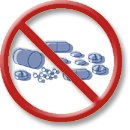|
Each
year, elderly people in the U.S. make almost 17 million outpatient
visits, either to their doctor's office or to a local hospital.
Many of these visits occur so that patients can either fill
an existing prescription, or get a new prescription for medication.
Unfortunately, elderly patients sometimes receive drugs included
in the Beers Criteria. Also known as the "always avoid" list,
the Beers Criteria contains approximately three dozen medications
that can cause adverse side-effects when given to older people,
ranging from memory problems to dizziness, falls and high
blood pressure.
To see how often elderly people receive inappropriate medications,
the author of this study reviewed more than 8,100 outpatient
visits made by senior citizens to doctors' offices and hospitals
between 1995 and 2000. The analysis showed that in 7.8 percent
of the visits - nearly one in 12 - an elderly patient received
one or more drugs from the "always avoid" list.  Elderly women
over age 65 were twice as likely to get an inappropriate prescription
than elderly men, and the risk of getting an unsafe medication
was higher for patients who took several medications compared
to those who took fewer medications. Elderly women
over age 65 were twice as likely to get an inappropriate prescription
than elderly men, and the risk of getting an unsafe medication
was higher for patients who took several medications compared
to those who took fewer medications.
Receiving the wrong medication can have serious - even fatal
- consequences. If you (or a family member) is above the age
of 65 and on prescription medication, here are a few recommendations:
- Ask the doctor if he or she is aware of the Beers Criteria.
- Bring a list of drugs you (or your family member) is
taking to each doctor.
- Before starting a new medication, talk to the doctor about
possible side-effects.
- Also, before starting a new medication, ask about taking
tests on memory, mood and balance, so that any changes can
be monitored.
To learn more about senior health, visit www.chiroweb.com/find/archives/senior/
Reference:
Rauch Golding M. Inappropriate medication prescribing for
elderly ambulatory care patients. Archives of Internal
Medicine, Feb. 9, 2004;164(3), pp. 305-312.
|



